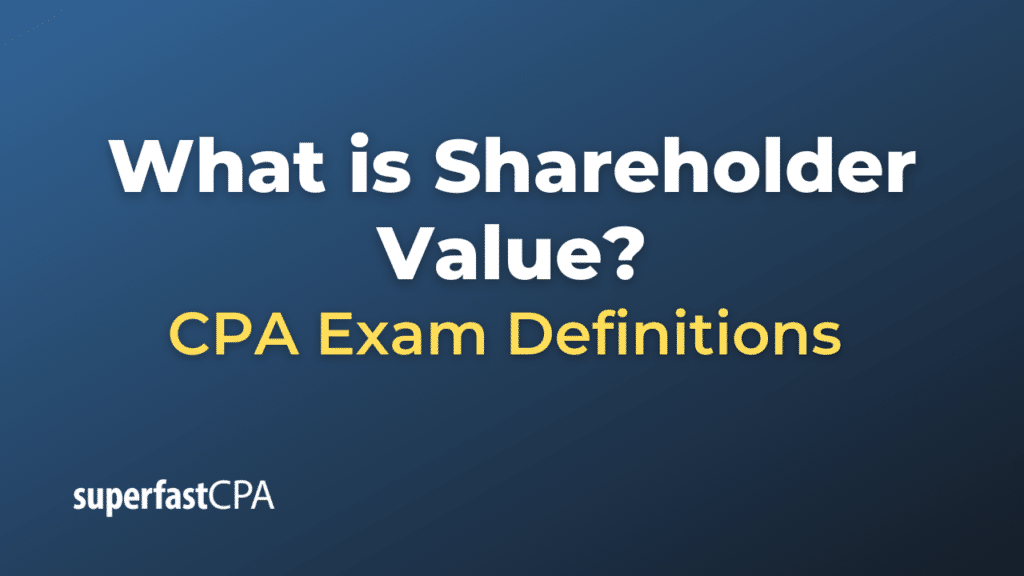Shareholder Value
Shareholder value is a business term that implies that the ultimate measure of a company’s success is the extent to which it enriches shareholders. It is based on the premise that shareholders, as the owners of the company, should benefit from any increase in the value of the company, primarily through rising share prices and dividend distributions.
Shareholder value can be generated in various ways, including:
- Operational Efficiency: By optimizing operations and reducing costs, a company can increase its profitability, which can lead to higher dividends and a rise in stock price.
- Strategic Decisions : Mergers, acquisitions, divestitures, or entering new markets can lead to an increase in shareholder value if executed effectively.
- Financial Management: Efficient capital allocation, optimal financing strategies (e.g., debt structure), and effective tax planning can enhance shareholder value.
- Return of Capital: Distributing profits to shareholders in the form of dividends or repurchasing a from the open market can directly benefit shareholders.
- Innovation and R&D: Investing in research and development to introduce new products or improve existing ones can lead to increased market share and profitability.
- Reputation and Branding: Building and maintaining a strong brand and reputation can lead to customer loyalty and premium pricing, both of which can increase profitability and shareholder value over time.
It’s important to note that while increasing shareholder value is crucial for publicly traded companies (given the demands of institutional investors, analysts, and individual shareholders), an excessive focus on short-term shareholder value can be detrimental. Such a narrow focus might discourage necessary long-term investments, lead to excessive risk-taking, or result in actions that harm other stakeholders, such as employees or the environment. In recent years, there’s been a push for companies to adopt a broader view, considering not just shareholder value but the interests of all stakeholders, including employees, customers, society, and the environment.
Example of Shareholder Value
Let’s use a fictional example involving a coffee shop chain to illustrate the concept of shareholder value:
Example: BrewDelight Corp., a publicly-traded coffee shop chain.
- Operational Efficiency: BrewDelight introduces a new inventory management system that reduces waste and ensures fresher ingredients. This leads to cost savings and better customer satisfaction, which subsequently increases profits and the stock price.
- Strategic Decisions: To tap into emerging markets, BrewDelight acquires a smaller coffee chain in Southeast Asia. This expansion leads to increased revenues, contributing to a rise in its stock price, thus benefiting the shareholders.
- Financial Management: BrewDelight refinances its debt at a lower interest rate, reducing its financial costs. This optimization boosts the company’s net income, enhancing shareholder value.
- Return of Capital: After a particularly profitable year, BrewDelight decides to distribute a part of its profits as dividends to its shareholders. Additionally, it initiates a share buyback program, purchasing its own shares from the open market. This action reduces the number of outstanding shares, increasing the earnings per share and potentially boosting the stock price.
- Innovation and R&D: BrewDelight invests in research to develop a unique blend of coffee exclusive to its stores. This new blend becomes incredibly popular, leading to increased sales and further enhancing shareholder value.
- Reputation and Branding: A marketing campaign highlighting BrewDelight’s commitment to sourcing sustainable and ethically produced coffee beans enhances its brand reputation. As a result, more customers choose BrewDelight over competitors, leading to higher sales and profits.
Over a few years, thanks to these combined actions, BrewDelight’s share price rises substantially. An investor who bought shares at the beginning of this period would see a significant return on their investment, either through the appreciation of the stock price, the dividends received, or both. This increase in the investor’s wealth illustrates the realization of shareholder value.
However, it’s essential to understand that while these actions boosted shareholder value in the short-to-medium term, BrewDelight’s leadership must continuously balance short-term gains with long-term sustainability and growth to ensure lasting shareholder value.













